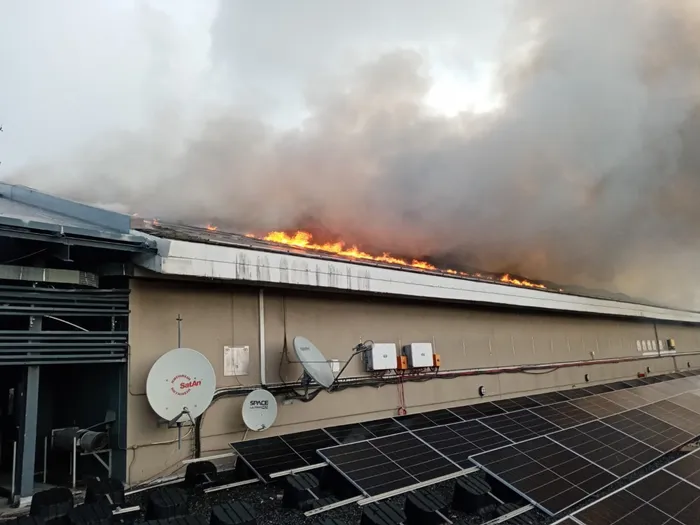Vodacom investigates fire at head office

A fire broke out on the roof of the Vodacom regional office in Century City just after 11am on Sunday. Picture: Supplied
Vodacom is investigating a fire that destroyed the solar panels on the roof of its regional office in Century City on Sunday, says a company spokesman, Byron Kennedy.
No one was injured and the building was evacuated successfully, he says.
The cause of the fire had yet to be determined and it was too early to comment on the extent of the damages, he said.
City Fire and Rescue Service spokesman Jermaine Carelse said the fire was contained just after 2pm on Sunday.
The fire had caused “substantial damages” to the building and a fire safety inspector was working at the scene this week to determine the cause of the fire, he said.
Fire-safety expert Professor Richard Walls, of Stellenbosch University, said it was highly possible that the fire started in the solar panels.
“Multiple elements of a solar PV system can lead to the ignition of a fire, which must be considered when designing and installing these systems. This includes ground faults, the hot-spot effect (localised hot areas on panels), overheating of components, and, most critically, arc faults. The build-up of combustible debris, like leaves or rubbish, within the system can also be problematic if ignited by an external source.”
The first step in preventing fires was to appoint a reputable and competent contractor to install and regularly maintain the system properly, he said.
In a statement last week, the City urged the public to be careful when using alternative power sources, such as inverters, solar panels and generators, to ease the impact of load shedding.
Power sources that were not installed, utilised and stored correctly could cause fires and explosions, the statement said.
“The City appreciates that residents want to protect themselves from the impacts of load-shedding, and many households and businesses nowadays are using various alternative power sources. However, the handful of incidents that we have on file are more than enough evidence that we all need to be incredibly cautious and vigilant about how we use and store these energy devices. Ventilation is a key consideration because of the risk of noxious gases from the use of petrol or diesel, but there is also the very real risk of devices overheating and catching fire,” said mayoral committee member for safety and security JP Smith.
Some of the incidents he referred to include:
• Four persons overcome by fumes from a generator in Parow. One of them died.
• A gas explosion at a home in Hout Bay, caused by the gas source not being switched off, resulting in an occupant sustaining burn wounds.
• A fire on a truck transporting a load of lithium-ion batteries. Firefighters managed to prevent the fire from spreading to the trailer, avoiding a major hazard.
• The batteries on an inverter in a store situated in a mall ignited, resulting in the mall having to close its doors while the incident was attended to.
• Solar panels on the roof of a factory caused the wires to arc, resulting in a fire. Firefighters had to wait for technicians to isolate the panels first before they could extinguish the fire.
• A firefighter was called on to extinguish a fire at a neighbouring property, after a battery bank overheated due to insufficient ventilation.

